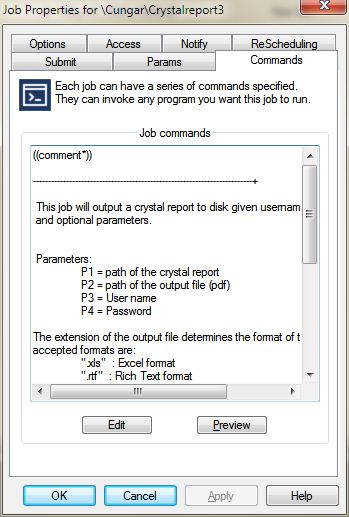The main function of most EnterpriseSCHEDULE jobs is the processing of the command list. The commands in the list are issued when the job is executed. The list may contain any batch file or executable accessible from the Windows environment. In addition any DOS commands which control the environment or flow of a batch file may be used.
The commands in a job are run through a pre-processor searching for control instructions and variable replacement expressions before the job is created. This allows the command expressions to read and/or modify aspects of the job before it is submitted. Once this is done, a temporary commands file is created and used by the job when it starts. For more on job preprocessing, see Job command preprocessing.
To input the Commands for jobs in EnterpriseSCHEDULE:

The Commands section can contain an embedded script or a reference to a script or executable (including it's path). Depending on the operating system, EnterpriseSCHEDULE supports a wide variety of scripting languages that can be selected from the Submit options.
The available scripting languages are:
Operating System |
Script type |
Windows |
Javascript |
|
MS Compute Cluster |
|
OSQL Script |
|
Perl Script |
|
Python Script |
|
Visual Basic Script |
|
Windows Batch File |
|
Windows Script File |
UNIX |
bash script |
|
csh script |
|
ksh script |
|
sh script |
|
Expect script |
|
Perl Script |
|
Python Script |
|
Time Limited Perl script |
OpenVMS |
com file |
In addition, custom script interpreters may be added.